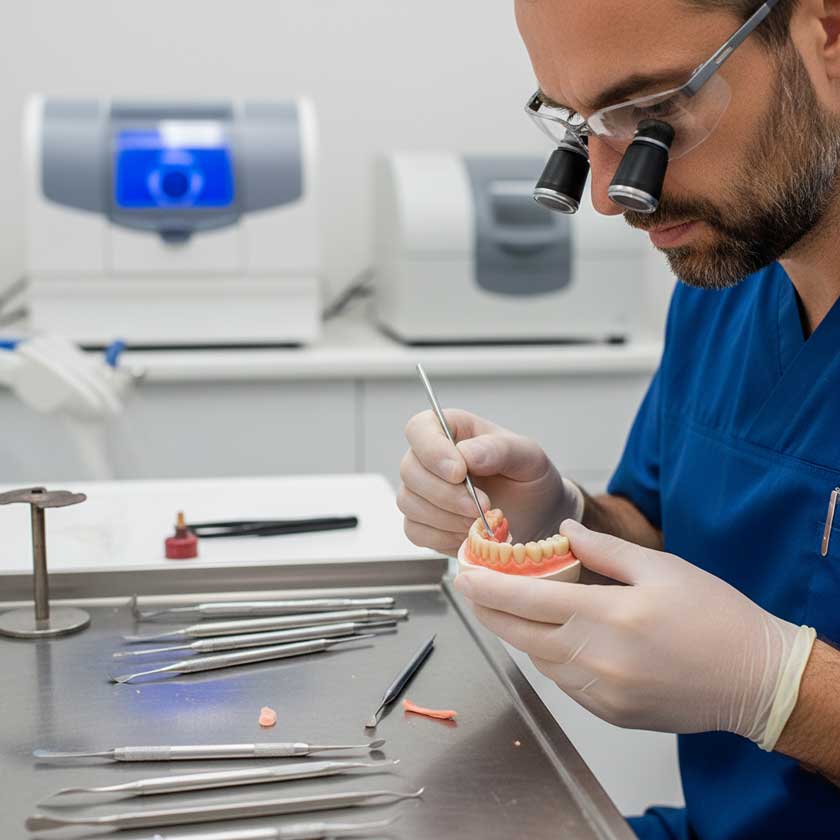Did you know 90% of people who lose their teeth feel bad about themselves? That’s how important it is to fix tooth loss ASAP. Learning about the denture process will make waiting for your new smile easier.
Talk to a trusted dental office. They can give you personalized advice and professional help for getting dentures.
Getting dentures can take a few weeks to a few months. Regular dentures take 4 to 6 weeks after pulling teeth. That’s a long time to wait but there are ways to be comfortable and live well.
Immediate dentures are for people who don’t want to be without teeth. They can be made before tooth extraction. This way, you won’t have to be toothless. Although temporary, they will still affect your appearance and self-esteem while waiting for your permanent dentures.
The denture fabrication process is detailed and involves many steps to ensure a good fit and natural look. But that means a slightly longer wait. Regular visits to your dentist are important. They help keep your gums and jaw healthy. This way, you won’t have problems that delay treatment.
Keypoints
- 4-6 weeks for denture fitting after tooth extraction
- Immediate dentures is a temporary solution
- Denture process involves many steps for good fit
- Regular dental visits during waiting period
- Tooth loss affects self-esteem and social life

The denture process: From extraction to new smile.
Getting a new smile through denture fabrication requires time and precision. Preparing for your new teeth involves learning about the denture process, the healing period after tooth extractions and choosing the right shapes and colors. From extraction to final fitting, your dental team will create customized dentures for you to eat, speak and smile with confidence.
Denture fabrication timeline
Denture fabrication takes weeks to months. Plan your extraction appointment to ensure a seamless transition to immediate dentures after the surgery.
After tooth extraction, gum tissue healing takes 6 to 8 weeks. Bone socket filling takes 6 to 8 months. This varies depending on healing rate and denture type.
Immediate vs. conventional dentures
Immediate dentures are a quick fix worn the same day as tooth extraction. They cover the healing sockets and prevent jaw atrophy. Conventional dentures require a 4-6 week waiting period for gum and jawbone healing.
Customization and fitting process
The denture fitting process involves many steps for comfort and function. It starts with detailed dental impressions of your mouth which will guide the creation of your denture base and artificial teeth. Designing dentures to match the shape, color and arrangement of your natural teeth is important for comfort and appearance.
Regular visits for adjustments. This will ensure a good fit as your mouth heals and changes shape.
“Proper fit is key to denture comfort and function. We customize each set to the patient’s unique oral anatomy.”
Whether you choose immediate or conventional dentures, the goal is to get a comfortable and functional teeth. Your dentist will guide you through each step and provide the support and expertise to ensure your new dentures meets your needs and expectation.
Do you have to go toothless while waiting for dentures?
Good news! You don’t have to go toothless while waiting for your dentures. After tooth extraction, there are many things to consider, including the healing period and the option of immediate dentures. Dentists offer temporary dentures as a quick fix. These dentures will cover your gums and keep your smile looking good while you heal, gives you relief during this transition period.
Immediate dentures is put in right after you get your teeth pulled. It lasts 6 to 8 months. This is longer than the healing period of your gums which is usually 6 weeks after pulling out molars.
Here’s a comparison of temporary dentures and other tooth replacement options:
Immediate dentures need more adjustments as your gums heal. But it gives you a quick way to have a smile and confidence. Your dentist can help you decide which one is best for you based on your needs and health.
Temporary toothless life
Temporary toothless can change your daily life. The number of remaining teeth can affect the timing and type of dentures needed. It brings challenges like eating hard and social changes. Let’s see how missing teeth affect our lives.
Eating and dietary adjustments
Eating is easier with teeth. But people often stick to soft foods which can make their diet less varied and can be bad for their health.
Speech and communication problems
Missing teeth also makes talking hard. Teeth helps us make sounds so without them talking can be tough, making social situations harder.
Psychological and social effects
But it’s not just about eating and talking. Missing teeth can also affect how we feel about ourselves. People might feel less confident or hide their smile. Remember these feelings are temporary and can improve with time and support, there’s hope for a brighter smile in the future.
"Temporary dentures is a short term solution that can help maintain social confidence and self-esteem while waiting for permanent dentures."
Knowing these challenges is why we need temporary tooth solutions. It helps us maintain our mouth and confidence until we get our permanent teeth.

Taking care of your mouth during the waiting period.
While waiting for your implant supported dentures, take care of your mouth. Maintaining good oral health by keeping your teeth and gums clean is crucial during this period. It can take up to a year for your mouth to heal, so keep your teeth and gums clean.
Use a soft-bristled brush to brush your gums, tongue and roof of your mouth twice a day. This will remove plaque, keep your gums healthy and help them heal faster.
A saltwater rinse can be soothing and kills bacteria. Mix a teaspoon of salt in warm water and swish it around your mouth. If you’re using temporary dentures, clean them well when not in use.
Your diet is also important for your mouth’s health. Eat foods rich in vitamins A and C to help your mouth heal. Avoid hard or sticky foods that can hurt your gums.
If you’re using temporary denture, be careful when eating. Regular dental check-ups are also important. They will help your dentist check your gum health and make any necessary adjustments.
Good oral care during this period is not just about comfort. It also helps your implant supported dentures to work well for years to come. With proper care these dentures can last 15 years or more.
FAQ
How long does the denture process take?
Getting dentures can take weeks or even months. Tooth extractions is a crucial step in preparing for dentures and the healing process can affect the timeline. It depends on the type of dentures and how well you heal.
Immediate dentures is ready before you get your teeth pulled. This way you can have teeth right away.
Conventional dentures need 4-6 weeks after pulling teeth. This allows your gums and jaw to heal properly.
What is the difference between immediate and conventional dentures?
Immediate dentures is made before you get your teeth pulled. It goes in right after, so you don’t have to go without teeth. Conventional dentures however need 4-6 weeks to wait for your gums and jaw to heal.
Do I have to go without teeth while waiting for permanent dentures?
No, you don’t have to go without teeth. Dentists can give you immediate or temporary dentures on the same day as your tooth extraction. These dentures is a temporary solution until your permanent dentures is ready.
How will temporary toothlessness affect your daily life?
Losing teeth temporarily can make eating harder. You might need to eat softer foods. It can also affect how you talk and communicate.
Missing teeth can make you feel less confident and self-assured.
What oral care is recommended while waiting for dentures?
Brush your mouth gently with a soft brush twice a day to your gums, tongue and roof of your mouth. Use a mild saltwater solution or mouthwash without alcohol to kill bacteria and soothe your mouth.
Eat foods rich in vitamins A and C to help your mouth heal and stay healthy.
How can dentures be made to fit and feel good?
Making dentures involves taking impressions of your mouth. Then the denture base and teeth is made. The goal is to get a perfect fit.
Regular dental check-ups is key. It will help your dentist check your gum health and make adjustments for comfort and function.








